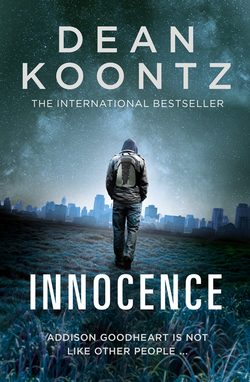Читать книгу Innocence - Dean Koontz, Dean Koontz - Страница 11
Five
ОглавлениеMORE THAN EIGHTEEN YEARS LATER, IN THIS familiar yet mysterious city, came the December that changed my life.
When I went out that night, with a backpack slung from my shoulders because I intended to partially restock my larder, I took a pair of compact LED flashlights, the first in hand, the second clipped to my belt in case the other failed. The route from my rooms to the metropolis above was for the most part dark, as are many passages in this world, underground and not, concrete and not.
A five-foot-wide corridor led out of the hammock room for ten feet, where it appeared to terminate in a blank wall. I reached high, to the top right corner, inserted an index finger in the hole that was the only feature on that smooth surface, and pressed the latch-release button in there. The foot-thick slab pivoted silently on a concealed pair of over-under ball-bearing hinges that were set one foot from its left edge.
The resultant opening was four feet wide. After I crossed the threshold, the massive door swung shut and latched behind me.
Even without light, I could navigate the second corridor: eight feet straight ahead, then the curve to the left, and finally ten feet to a cunningly designed louver door. From the farther side, the door appeared to be merely the cover for a large ventilation shaft.
In darkness, I listened, but the only things that passed between the louvers were silence and a draft as faint and cool and pure as the breath of a snowman brought to life by love and magic.
The air carried the scent of damp concrete, the lime that had fluoresced from the walls over the decades. In this section of the city’s underworld, I never smelled the decomposing rats or the foul molds that sometimes flourished elsewhere.
Like the pivoting concrete wall, the louver door featured a hidden lock release. It closed automatically behind me.
I switched on the flashlight, and a storm drain formed out of the darkness, as if the blade of light carved it from bedrock. The great cylindrical concrete tunnel appeared sufficiently large to spare the world from a repeat of Noah’s flood.
On occasion, maintenance teams in electric vehicles the size of pickup trucks passed through primary drains like this. At the moment, however, I was alone. Over the years, I had seldom glimpsed such crews at a distance, and more seldom still had I needed to flee from them to avoid being seen.
I seemed almost to have had cast upon me a spell of solitude. When I traveled below or above ground, people usually turned away from me and I from them in the moment before they might have seen me.
Otherwise, I would have been murdered long ago.
The most recent major rainstorm had been in late October. The tunnel bored into dryness, the floor littered with the small things—plastic bags, empty beer and soda cans, fast-food containers, cups from Starbucks, a knitted glove, a baby’s shoe, a sparkling fragment of costume jewelry—that had settled out of the flow as the last of the runoff withered away.
The amount of debris was not great. I could have walked for miles without stepping on anything. Raised three feet off the floor, however, along both sides of the drain, were maintenance walkways where the surging water rarely deposited trash.
Periodically I passed other louver panels that were nothing more than they appeared to be, and iron-rung ladders that led up to service traps in the ceiling, and the mouths of smaller tributary pipes that, during a storm, fed water to this drain.
In this subterranean maze, earlier drains than this one were built of brick or stone, or concrete blocks. They possessed greater charm than more recent constructions, for they were the work of masons who were also proud craftsmen.
According to metropolitan lore, one crew of masons had been secretly in the employ of a crime boss of that distant era, and they had walled up several of his enemies, some dead but others living. I had never seen one of the small crosses that were supposedly carved into bricks to mark those tombs, nor had I seen any skeletal fingers in the gaps of mortar between stones, like once-questing but long-fossilized pale roots. Perhaps such stories were not true, just urban legends, though I was well aware of how inhumane humanity can be.
When I was halfway to the first intersection of major drains, I spotted a familiar glowing silver-white mist in the distance, one of the Fogs. A coherent and sinuous stream, it swam toward me as if the air through which it moved were water and it were a luminous eel.
I stopped to watch, always curious about this phenomenon and about the other that I called the Clears. In my experience, I had no reason to be afraid, but I admit to feeling uneasy.
Unlike a tendril of genuine fog or an exhalation of steam from a vent, this apparition didn’t feather away at the edges or change shape according to the influence of currents in the air. Instead it serpentined toward me, perhaps seven or eight feet in length and a foot in diameter, and as it passed me, it halted and stood on end for a moment, writhing in the center of the tunnel, as if it were a cobra enchanted by the music of a flute. Thereafter it went horizontal once more and shimmered away, a slither of silvery radiance diminishing to a point, and then gone.
I had seen the Fogs and Clears all of my life. I hoped one day to know for certain what they were and what they meant, although I suspected that I might never be enlightened. Or if I discovered the truth of them, there might be a high price to pay for that knowledge.
